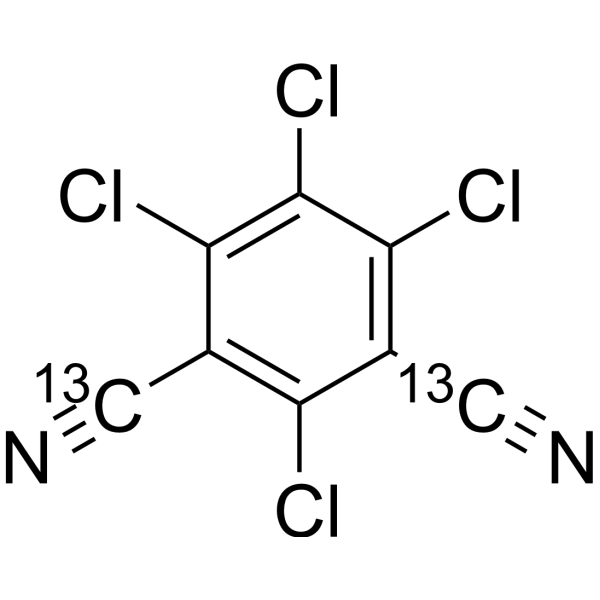Chlorothalonil-13C2
Modify Date: 2025-08-22 16:38:19

Chlorothalonil-13C2 structure
|
Common Name | Chlorothalonil-13C2 | ||
|---|---|---|---|---|
| CAS Number | 2767332-24-9 | Molecular Weight | 267.90 | |
| Density | N/A | Boiling Point | N/A | |
| Molecular Formula | C613C2Cl4N2 | Melting Point | N/A | |
| MSDS | N/A | Flash Point | N/A | |
Use of Chlorothalonil-13C2Chlorothalonil-13C2 is the 13C-labeled Chlorothalonil. Chlorothalonil is a broad spectrum fungicide and is effective in protecting plants against fungal diseases caused mainly by Phytophthora infestans and Alternaria solani. Chlorothalonil is used for controlling of fungal foliar diseases of vegetables and crops[1][2]. |
| Name | Chlorothalonil-13C2 |
|---|
| Description | Chlorothalonil-13C2 is the 13C-labeled Chlorothalonil. Chlorothalonil is a broad spectrum fungicide and is effective in protecting plants against fungal diseases caused mainly by Phytophthora infestans and Alternaria solani. Chlorothalonil is used for controlling of fungal foliar diseases of vegetables and crops[1][2]. |
|---|---|
| Related Catalog | |
| In Vitro | Stable heavy isotopes of hydrogen, carbon, and other elements have been incorporated into drug molecules, largely as tracers for quantitation during the drug development process. Deuteration has gained attention because of its potential to affect the pharmacokinetic and metabolic profiles of drugs[3]. |
| References |
| Molecular Formula | C613C2Cl4N2 |
|---|---|
| Molecular Weight | 267.90 |